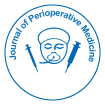
Journal of Perioperative Medicine
Open Access
ISSN: 2684-1290

ISSN: 2684-1290
Commentary - (2024)Volume 7, Issue 2
In the realm of modern medicine, advancements are continually reshaping traditional practices, enhancing patient outcomes, and challenging conventional methodologies. One such evolution that stands at the forefront of healthcare innovation is the integration of perioperative medicine into surgical procedures. Perioperative medicine encompasses a multidisciplinary approach aimed at optimizing patient care from the preoperative period through the intraoperative phase and extending into the postoperative recovery process. This holistic approach has revolutionized surgical care, ushering in a new era of comprehensive patient management and improved clinical outcomes.
Traditionally, the focus of surgical intervention has primarily been on the technical aspects of the procedure itself, often overlooking the broader physiological and psychological factors that influence patient health and recovery. However, the introduction of perioperative medicine has shifted this paradigm by placing emphasis on preoperative risk assessment, optimization of patient health, and proactive management of postoperative complications.
One of the fundamental pillars of perioperative medicine is preoperative risk assessment. By conducting a thorough evaluation of a patient's medical history, comorbidities, and physiological status, healthcare providers can identify potential risk factors that may predispose patients to perioperative complications. Armed with this information, clinicians can develop personalized care plans significant to address individual patient needs, thereby minimizing the likelihood of adverse events during and after surgery.
Moreover, the integration of perioperative medicine has led to significant advancements in preoperative optimization strategies. Through the implementation of evidence-based interventions such as nutritional support, physical conditioning, and smoking cessation programs, healthcare providers can enhance patient fitness levels and mitigate the risk of postoperative complications. By optimizing patient health prior to surgery, clinicians can improve surgical outcomes, shorten hospital stays, and reduce healthcare costs—a win-win for patients, providers, and healthcare systems alike.
In addition to preoperative preparation, perioperative medicine emphasizes the importance of intraoperative care coordination and optimization. By leveraging advancements in anesthesia techniques, intraoperative monitoring technologies, and surgical innovations, clinicians can ensure optimal patient safety and surgical precision. Furthermore, the integration of Enhanced Recovery After Surgery (ERAS) protocols has revolutionized postoperative care by promoting early mobilization, multimodal pain management, and proactive fluid management strategies. These initiatives not only expedite patient recovery but also minimize the risk of postoperative complications such as surgical site infections, venous thromboembolism, and delirium.
Beyond the immediate perioperative period, the impact of perioperative medicine extends into the realm of long-term patient outcomes and quality of life. By fostering continuity of care and implementing comprehensive discharge planning protocols, healthcare providers can support patients throughout the postoperative recovery process, ensuring a smooth transition from hospital to home. Moreover, by leveraging telemedicine technologies and remote monitoring platforms, clinicians can remotely track patient progress, identify potential complications, and intervene promptly, thereby reducing the likelihood of hospital readmissions and improving patient satisfaction.
Furthermore, the integration of perioperative medicine has spurred a paradigm shift in healthcare delivery, fostering collaboration among multidisciplinary teams and breaking down silos between surgical specialties, anesthesia providers, primary care physicians, and allied health professionals. This team-based approach allows for seamless coordination of care, continuity of communication, and shared decision-making, ultimately leading to more holistic patient management and improved clinical outcomes.
In conclusion, the integration of perioperative medicine represents a transformative shift in surgical care delivery, emphasizing a holistic approach to patient management that extends beyond the operating room. By addressing the comprehensive needs of patients throughout the perioperative continuum, healthcare providers can optimize surgical outcomes, enhance patient satisfaction, and improve the overall quality of care. As we continue to embrace the principles of perioperative medicine, we move closer towards a future where surgery is not only a technical intervention but a holistic journey towards improved patient health and well-being.
Citation: Rothstein D (2024) Revolutionizing Healthcare: Transforming Surgery through Perioperative Medicine. J Perioper Med. 7:214.
Received: 04-Mar-2024, Manuscript No. JPME-24-29988; Editor assigned: 06-Mar-2024, Pre QC No. JPME-24-29988 (PQ); Reviewed: 20-Mar-2024, QC No. JPME-24-29988; Revised: 27-Mar-2024, Manuscript No. JPME-24-29988 (R); Published: 03-Apr-2024 , DOI: 10.35248/2684-1290.24.7.214
Copyright: © 2024 Rothstein D. This is an open-access article distributed under the terms of the Creative Commons Attribution License, which permits unrestricted use, distribution, and reproduction in any medium, provided the original author and source are credited.